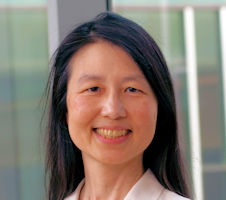
 |
Professor Jeannette M WingColumbia University, Data Science InstituteWhat a truly pleasant surprise--and honor! |
Jeannette M. Wing is Avanessians Director of the Data Science Institute and Professor of Computer Science at Columbia University. From 2013-2017, she was a Corporate Vice President of Microsoft Research. She is Adjunct Professor of Computer Science at Carnegie Mellon where she twice served as the Head of the Computer Science Department and had been on the faculty since 1985. From 2007-2010 she was the Assistant Director of the Computer and Information Science and Engineering Directorate at the National Science Foundation. She received her S.B., S.M., and Ph.D. degrees in Computer Science, all from the Massachusetts Institute of Technology.
Professor Wing's general research interests are in the areas of security and privacy, specification and verification, concurrent and distributed systems, programming languages, and software engineering. Her current research focus is on trustworthy AI. Her 2006 seminal essay, titled “Computational Thinking,” is credited with helping to establish the centrality of computer science to problem-solving in fields where previously it had not been embraced.
She serves or has served on many academic, government, and industry advisory boards. She received the CRA Distinguished Service Award in 2011 and the ACM Distinguished Service Award in 2014. She is a Fellow of the American Academy of Arts and Sciences, American Association for the Advancement of Science, the Association for Computing Machinery (ACM), and the Institute of Electrical and Electronic Engineers (IEEE). She grew up in New York.
How I got interested in computer science
"Growing up, math was my favorite subject. I also enjoyed doing puzzles, playing word games, and solving logic problems. Inspired by an after-dinner conversation that I had with my father when I was in 11th grade, I decided to study engineering because in response to my question “What is engineering?” he said “Engineering is about solving real-world problems using math.” Who would not want to be an engineer after that answer? In college, I started as an electrical engineering major and took a required computer science course on the structure and interpretation of computer programs. This course exposed me to many new concepts and new ways of thinking, but what inspired me most was lambda calculus. I even had dreams about the Y operator. Lambda calculus was a kind of mathematics that I had never seen before and I was taken by its elegance, expressiveness, and purity. I thought to myself that if this theory is part of the foundations of computer science, then I wanted to study computer science. I switched majors and never looked back. To this day, pursuit of a mathematical understanding of computational systems drives my research."
